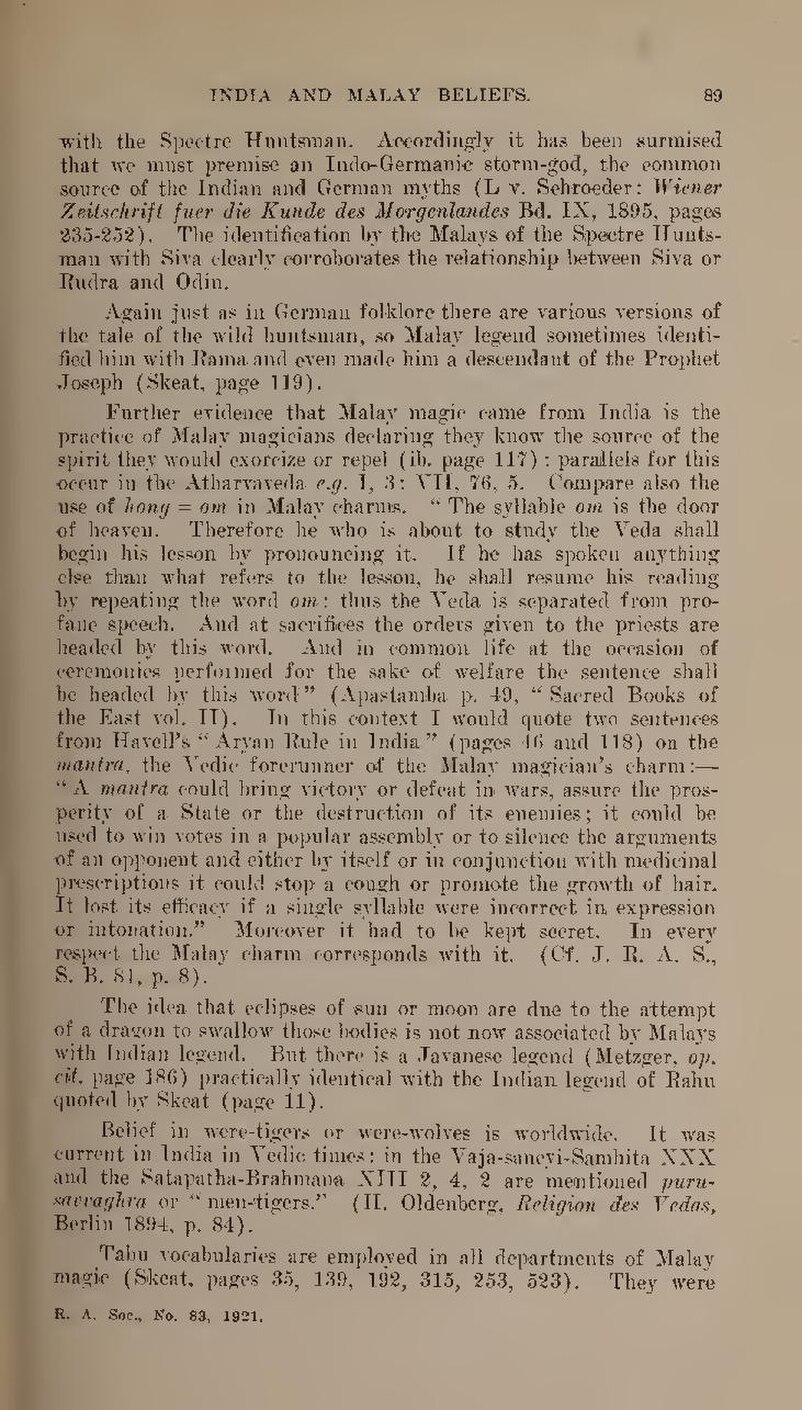with the Spectre Huntsman. Accordingly it has been surmised that we must premise an Indo-Germanic storm-god, the common source of the Indian and German myths (L v. Schroeder: Wiener Zeitschrift fuer die Kunde des Morgenlandes Bd. IX, 1895, pages 235-252). The identification by the Malays of the Spectre Huntsman with Siva clearly corroborates the relationship between Siva or Rudra and Odin.
Again just as in German folklore there are various versions of the tale of the wild huntsman, so Malay legend sometimes identified him with Rama and even made him a descendant of the Prophet Joseph (Skeat, page 119).
Further evidence that Malay magic came from India is the practice of Malay magicians declaring they know the source of the spirit they would exorcize or repel (ib. page 117): parallels for this occur in the Atharvaveda e.g. 1, 3: VII, 76, 5. Compare also the use of hong = om in Malay charms. The syllable om is the door of heaven. Therefore he who is about to study the Veda shall begin his lesson by pronouncing it. If he has spoken anything clse than what refers to the lesson, he shall resume his reading by repeating the word om: thus the Veda is separated from profane speech. And at sacrifices the orders given to the priests are headed by this word. And in common life at the occasion of ceremonies performed for the sake of welfare the sentence shall be headed by this word" (Apastamba p. 49, "Sacred Books of the East vol. II). In this context I would quote two sentences from Havell's "Aryan Rule in India" (pages 46 and 118) on the mantra, the Vedic forerunner of the Malay magician's charm:— "A mantra could bring victory or defeat in wars, assure the prosperity of a State or the destruction of its enemies; it could be used to win votes in a popular assembly or to silence the arguments of an opponent and either by itself or in conjunction with medicinal prescriptions it could stop a cough or promote the growth of hair. It lost its efficacy if a single syllable were incorrect in expression or intonation." Moreover it had to be kept secret. In every respect the Malay charm corresponds with it. (Cf. J. R. A. S., S. B. 81, p. 8).
The idea that eclipses of sun or moon are due to the attempt of a dragon to swallow those bodies is not now associated by Malays with Indian legend. But there is a Javanese legend (Metzger, op. cit. page 186) practically identical with the Indian legend of Rahu quoted by Skeat (page 11).
Belief in were-tigers or were-wolves is worldwide. current in India in Vedic times; in the Vaja-saneyi-Samhita XXX and the Satapatha-Brahmana XIII 2, 4, 2 are mentioned purusavraghra or "men-tigers." (II. Oldenberg, Religion des Vedas, Berlin 1894, p. 84).
Tabu vocabularies are employed in all departments of Malay magie (Skeat, pages 35, 139, 192, 315, 253, 523). They were
